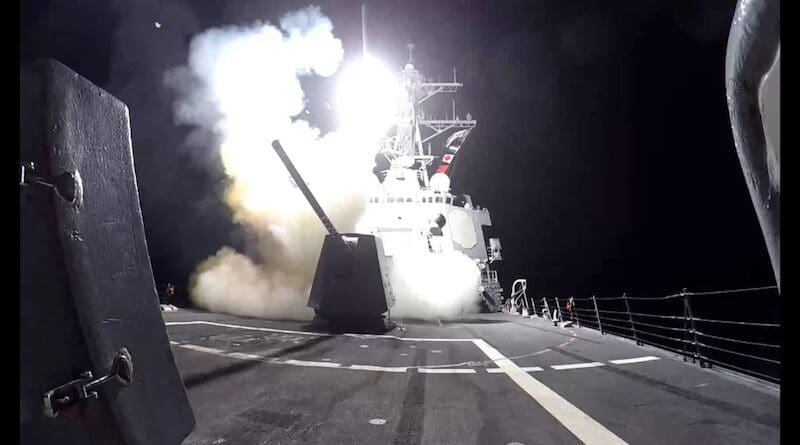How The US Coalition In The Red Sea Is Not Helping – OpEd
By Greg Pence
Once again, the United States has formed a military alliance without the sanction of the UN Security Council. This alliance, dubbed “Operation Prosperity Guardian,” aims to ensure the freedom of navigation and counter the Houthis’ assaults. However, the shadow of past military endeavors in the Middle East looms large, casting doubt on the potential success of this coalition.
Historically, similar U.S.-led coalitions have not yielded the intended outcomes. For instance, the “Global War on Terrorism” saw the U.S. and its allies, particularly from Europe and NATO, engage in Afghanistan. Despite initial objectives, the campaign concluded with the Taliban emerging more formidable than before. This outcome was reached without the full alignment of European interests.
Today, the geopolitical landscape has evolved. The U.S.-China rivalry has intensified, global opposition to American initiatives has strengthened, and America and Europe face simultaneous challenges on multiple fronts, unlike before. Given these circumstances, the prospects of a naval coalition achieving its goals seem slim, especially considering Europe’s current preoccupations with the conflict in Ukraine and its struggles with maritime operations, such as managing the influx of migrants from North Africa.
In this context, it appears that the U.S. may be leading Europe into another conflict—one that the continent is neither equipped to handle nor stands to benefit from entering.
For nearly half a millennium, since the Portuguese sought a maritime path to Asia, the Red Sea has been a critical economic and strategic conduit, witnessing tensions among regional players and power struggles among major global forces. This vital waterway, responsible for approximately 30% of global container ship traffic and the daily transit of 1.7 million barrels of oil and 4.5 billion cubic meters of natural gas, has recently faced security challenges. These disruptions, attributed to the Houthis’ actions, ostensibly aim to protest against Israel’s policies towards Gaza.
Given the Red Sea’s significance, reinstating safe and open navigation is of international concern. The United States has proposed a maritime coalition to address the transportation disruptions and seek a peaceful resolution in the region. Washington is rallying its traditional allies, particularly in Europe, to support this initiative. However, European nations, already grappling with the complexities of previous coalitions and current regional conflicts, appear hesitant to commit to this new alliance, weighed down by prevailing uncertainties and the challenges they are facing.
European nations face a multifaceted dilemma: they are perceived as staunch allies of Israel, which complicates their position in international relations. The potential for escalating tensions and its regional implications raise concerns about triggering a refugee crisis that could reach Europe’s borders. Moreover, Europe’s military resources are stretched thin, having already committed significant support to Ukraine. This leaves little capacity for additional interventions, particularly those not sanctioned by the UN Security Council or defined within NATO’s scope.
Spain’s initial pledge to join the coalition was retracted by Prime Minister Pedro Sánchez’s government, reflecting a broader European reluctance to engage in unsanctioned coalitions. Italy has declared that its naval assets will remain under national command, indicating a preference for autonomy over collective action. France, too, expresses reservations about diverting its resources to the Red Sea, which could undermine its strategic presence in the Mediterranean.
A notable absence of key Arab nations, such as Egypt, Saudi Arabia, and the United Arab Emirates, from this coalition further diminishes its perceived legitimacy. This is compounded by Europe’s historical challenges with naval operations, exemplified by the unsuccessful attempts to manage Mediterranean migration flows, which inadvertently led to blockades against Tunisia and Libya.
Recent months have seen significant shifts in European military engagements: the last German soldier has departed from Mali, and France is scaling back its longstanding presence in Africa. Concurrently, Europe’s capacity to sustain support for Ukraine is waning. The conflict in Gaza has further compounded Europe’s security challenges, raising concerns over regional stability, energy supplies, and the risks associated with increased migration and terrorism.
Amidst these developments, the prospect of joining a new conflict in the Red Sea—particularly one led by the United States, which has previously demonstrated a willingness to act unilaterally—poses a dilemma for Europe. Such an engagement may not align with European strategic objectives. Moreover, it risks undermining the international legal order and exacerbating regional tensions in Gaza, outcomes that Europe is keen to avoid.

